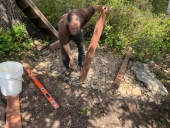





Fred Tyler wrote:Growing alongside the edge of the road up on the lab, i found Jerusalem oak goosefoot (Dysphania botrys). It is in the Amaranth family and the way its seeds cluster on the stems gives it away. I took note of this plant because to me it smelled like a grand fir. Online descriptions list it as having "an agreeable aromatic smell" and "a strong scent, reminiscent of stock cubes". I'm not sure what people are making their stock cubes out of, because to me, this smells like a fir tree! Apparently it has been used in dried flower arrangements. At least on the lab, any meal made with it will probably include an unhealthy amount of sand...leaves and seed pods are pretty sticky.

Yen Yus wrote:Septic systems do drain out into the soil but they are full of water so the worms would drown.
Worms have an antibacterial system in their gut. Also the soil below and the gravel have a lot of good bugs since it's an aerobic system. These bugs help eliminate the bad bugs in the blackwater.
You should check your local freeze depth and make it below there imho. Mine is not in a container and they are pretty warm in the winter and cool in the summer due to the earth's stable temperature.
Felicia Rain wrote:
How deep down does this storage container need to be placed in the soil in a climate that has cold winter?

Yen Yus wrote:How lovely..
Julien Vailles wrote:There is this great resource with build design and maintenance steps here - http://www.vermicompostingtoilets.net/
I'm building it at the moment with IBC tank, I'll take a few pics and we share my exp later.
Cheers,
Julien

Yen Yus wrote:Hi Frank
Since the septic system is full of water the worms would drown. They like a moist medium. I've seen soldier fly larvae swim underwater so that may be an interesting experiment.
Frank Voi wrote:I am interested in how worms interact normally with conventional septic systems? Do they clean out the septic bed?